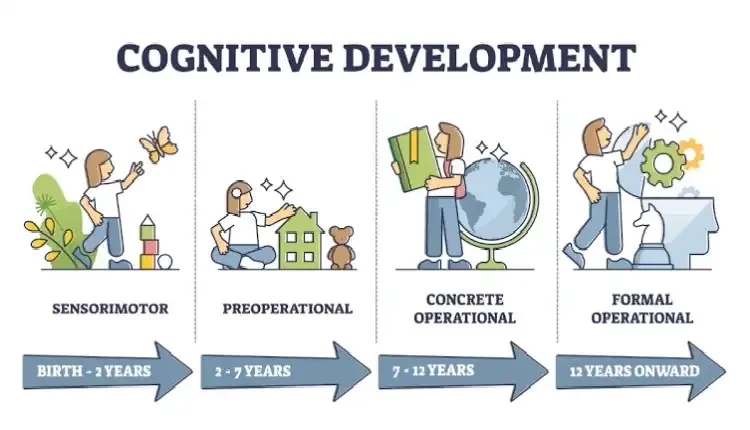Naturally, you want the best for your child—for them to have a bright future and be successful in whatever they choose to do in life. A big part of achieving this is helping them develop cognitively. Cognitive development mainly takes place in four stages: infancy, childhood, adolescence, and adulthood. Each stage is characterised by unique changes in cognitive abilities.
The good news is that cognitive development is largely influenced by the environment in which a child grows up. This means that as a parent, you have a major role in shaping your child’s ability to think and learn. There are things you can do to help promote cognitive development and give your child a head start in life. In this post, we’ll discuss the importance of cognitive development and share some tips on how you can help your child grow intellectually.
What is meant by “cognitive development”?
When you think about it, cognitive development is pretty darn important. After all, it’s what helps us make sense of the world around us and figure out how to navigate our way through life. So, what is meant by cognitive development? In short, it is a process of acquiring knowledge and skills. This includes the ability to think, reason, and solve problems. It also includes acquiring new vocabulary, learning new facts, and developing an understanding of the world around us.
Cognitive development starts with our ability to process information and develop an understanding of the world around us. This happens during our earliest years, as we start to learn the language and develop skills like problem-solving and critical thinking. As we get older, our cognitive skills continue to grow and evolve, and we start to learn more complex concepts and ideas. We become better at understanding other people’s perspectives, and we learn how to think more abstractly.
Cognitive development is a lifelong process, and it’s something that continues to evolve as we age. So it’s something worth paying attention to!
What are the theories of cognitive development?
Many theories have been proposed for cognitive development, but one of the most well-known is the Piagetian theory. According to this theory, for cognitive development, your brain goes through four stages as you grow and learn: sensorimotor, preoperational, concrete operational, and formal operational. Here’s a quick overview of each:
- Sensorimotor stage: the earliest stage, which begins at birth and lasts until 2 years of age. At this stage, they learn to understand the world through their senses. They study their environment and know how things work.
- Pre-operational Stage: This stage starts at about 2 years of age and lasts up to 7 years of age. At this stage, the child learns abstract thoughts. They begin to understand concepts like time and space and use words to express their thoughts.
- Concrete operational phase: This phase begins around the age of 7 and lasts until the age of 12. At this stage, your child can think logically about certain objects. They can solve problems using logic and reasoning and understand real-life situations better.
- Formal operational stage: This stage begins around 12 years of age and continues into adulthood. At this stage, your child can think abstractly about concrete objects and interpret situations. Develop critical thinking skills in science and mathematics.
Why is cognitive development important?
When it comes to cognitive development, there are a few things that are important for your child to learn.
One is the ability to think abstractly. This means that your child can understand that objects exist even when they’re not visible. They can also think about things that aren’t currently happening and predict what might happen in the future.
Another important skill is being able to reason. This means that your child can figure out the how and why of things and come up with logical solutions to problems.
Finally, your child’s ability to recall information is required. This includes both short-term and long-term memories. With strong memories, your child can learn more effectively and build a strong foundation for future academic success.
How does cognitive development occur?

Process of cognitive development: Sensorimotor (2 years), Preoperational (2-7 years), Concrete operation (7-12 years) and Formal operational (12 years onward)
You might be wondering how cognitive development occurs. Basically, the process starts with sensory input, which the brain then organises and processes. This is followed by cognitive growth, which leads to thought and reasoning.
Next comes abstraction, or the ability to think about things in general terms, and this is followed by metacognition, or thinking about thinking. Finally, we achieve full cognitive development when we’re able to apply all of this knowledge to the world around us.
So as you can see, there’s a lot that goes into cognitive development, and it’s an ongoing process that starts from the moment we’re born and lasts throughout our lives.
What is the most important influence on cognitive development?
So, what is the most important influence on cognitive development? Well, reading is a great way to start. Research has shown that reading aloud to your child is one of the most effective ways to help them learn and grow.
In fact, it’s so important that the National Education Association has declared “Read Across America Day,” which is a nationwide reading celebration that happens every year on Dr. Seuss’s birthday. On this day, schools, libraries, and community centres all come together to celebrate reading in all its forms.
But reading isn’t the only activity that helps promote cognitive development. Playing games is another great way to help your child learn and grow. Board games, card games, or even just simple games like tag can help improve problem-solving skills, focus, and hand-eye coordination.
What are examples of cognitive development?
Cognitive skills are extremely important for babies and toddlers, as they are essential for learning and developing. So, what are examples of cognitive development? Let’s see:
One of the most important is object permanence, which is the understanding that objects continue to exist even when they can’t be seen. This milestone is usually reached between 6 and 8 months of age.
Next is symbolic representation, which is the ability to use symbols to represent ideas or objects. This milestone is usually reached between 18 and 24 months of age.
The development of logic and reasoning is a prime example of cognitive development. It’s required for problem-solving, which is essential for future endeavors. It’s basically the ability to form concepts and reason with them—to know the how and why of the process.
Another example is the ability to make judgments about what’s happening around them based on the information received and processed by the brain.
It’s also important for parents as well as teachers to be aware of their child’s level of creativity and imagination. These skills typically develop during the preschool years.
What Can You Do if You’re Concerned About Your Child’s Cognitive Development?
If you’re concerned about your child’s cognitive development, there are a few things you can do to help.
First of all, you need to make sure your child is getting enough sleep. A good night’s sleep is essential for cognitive development.
Second, make sure your child is eating healthy foods. Omega-3 fatty acids are especially important for cognitive development. So make sure your child is eating plenty of fish, nuts, and seeds.
Third, you need to make sure your child is getting enough exercise. Exercise helps the brain function better.
Fourth, encourage your child to explore new ideas, ask questions, and be expressive and creative.
And finally, make sure you’re providing a stimulating environment for your child. Read to your child, play games with your child, and take your child on educational outings. The more stimulation your child receives, the better his or her cognitive development will be.
Conclusion
It’s important to nurture cognitive development in your child, as this will help them to think creatively, solve problems, and learn new things. There are lots of different ways to help your child develop cognitively, and the most important thing is to be consistent.
Make sure you provide a stimulating environment for your child and give them plenty of opportunities to learn. Talk to them about what they’re doing, ask them questions, and help them understand the world around them.
Cognitive development is an important part of growing up, so make sure you do everything you can to support it. Your child will be grateful for it later.


